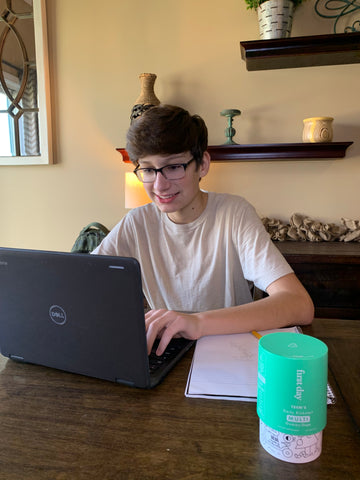With life having us buzzing and hustling, feeling anxious is becoming more common.
Did you know that a lot of people deal with anxiety? Almost 1 in every 5 grown-ups and 1 in every 3 teenagers have some kind of anxiety issue. It’s more common than you might think!
Also, did you know that something as simple as a vitamin could be the reason? Let’s explore the question, “Can lack of vitamin D cause anxiety?”
Vitamin D: The Power of The Sunshine Vitamin
Vitamin D isn’t just any vitamin; it’s the silent helper of your physical and mental well-being. It has two forms, D2 and D3, and they help keep you healthy. You might know it as the “sunshine vitamin,” and it has a special role in solving the puzzle of anxiety.
Vitamin D’s Role in Keeping Bones and Immunity Strong
You might think of calcium as the boss when it comes to your bones, and you’re right. But vitamin D is like the helper that makes sure your bones can use the calcium. Without enough vitamin D, your bones can become weak and break.
Think of it like building a tower. Calcium is the bricks, and vitamin D is the builder that puts them in the right spots to make a strong foundation.
But vitamin D is not only about strong bones; it’s also a coach for your immune system. Your immune system is like a team that keeps your body safe from germs. Vitamin D makes sure they’re ready for action. It helps them find and fight off bad germs that will make you sick.
Vitamin D is important for a stressed body or if you are coming down with something.
Cracking the Code of Anxiety: What It Is and What It Feels Like
Anxiety is not the same for everyone. Some people feel worried all the time, while others feel scared in certain situations. But what’s vitamin D got to do with anxiety?
Clues Your Body Gives When It Needs More Vitamin D
Sometimes when you don’t have enough vitamin D, your body tells you in different ways. Here are some signs to look out for:
- Feeling tired even after a good night’s sleep
- Muscles that feel weak or hurt for no reason
- Bones that ache without you getting hurt
- Getting sick more often because your immune system isn’t strong
- Feeling sad or worried, which can happen when you don’t have enough vitamin D
- Losing more hair than usual because your hair needs vitamin D to stay healthy
- Wounds take longer to heal because vitamin D helps with that
- Bones become weak and can break (osteoporosis)
Remember, these signs can stem from other things too. If you think you might need more vitamin D, it’s a good idea to talk to a doctor.
What Science Says About Vitamin D and Anxiety
Scientists have started to look into whether low vitamin D causes anxiety.
One study found that people with lower vitamin D levels might feel more anxious. It’s because vitamin D does things in our brain, like helping with happy feelings. This is because Vitamin D helps produce the hormones, serotonin and dopamine. While the study didn’t identify exactly how low vitamin D causes anxiety, it shows there might be a link.
How Vitamin D Works Its Magic

Now that we see the link between low vitamin D and anxiety, let’s find out how it does its special job.
Making Your Immune System Happy
Your immune system is like your body’s guard. Vitamin D is like the coach that helps your immune system stay strong and work well. When your immune system is strong, you feel better mentally too.
Helping with Inflammation and Feelings
Inflammation is when your body’s alarm system goes off to fight against things that might harm it. But too much inflammation can make you feel anxious. That’s where vitamin D comes in. Vitamin D has inflammation-stopping effects.
Vitamin D and the Happy Chemical
There’s a chemical in your brain called serotonin. It’s the one that makes you feel happy. Imagine it as a messenger between brain cells, telling them to be happy and calm. When there’s enough vitamin D, it helps make more serotonin.
So, vitamin D is like a happiness helper for your brain. It helps you feel good and not too worried.
How To Get More of That Sweet Vitamin D
Now that we know how important vitamin D is, let’s find out how to get more of it. There are three ways: sunshine, eating the right foods, and taking special vitamins.
Foods That Have Vitamin D
You can find vitamin D in some yummy foods:
- Fatty Fish, like salmon and sardines.
- Some foods, like milk and cereal, have extra vitamin D added to them.
- Eggs have a little bit of vitamin D too.
- Special mushrooms that have been in the sun can also give you a bit of vitamin D.
Sunshine: The Natural Vitamin D Maker
Like plants that soak up sunshine to grow, your body can make vitamin D when it gets enough sunlight. When your skin catches some sun, it’s like a magic trick that turns sunlight into vitamin D inside you. But be careful, you don’t want to get too much sun because that can be bad for your skin. So, sunscreen and a little bit of sun each day are perfect for making sure you get enough of that sweet vitamin D.
Taking Special Vitamins

Sometimes, you can’t get enough vitamin D from food or the sun. In that case, you can take special vitamins to help you. For fighting Vitamin D deficiency in teens and grown-ups, it’s a good idea to get about 15 µg (micrograms) every day. Remember to spend some time in the sun too, but don’t forget sunscreen!
At First Day, we’ve made it super easy for teens and grown-ups to get all the important stuff their body needs. Our special vitamins are not only delicious but also backed by science. So we make sure your teens get the best stuff without any extra junk like too much sugar or things they don’t need.
When you choose First Day, it’s not just about taking vitamins; it’s about taking care of yourself and your kids. Find out how our special vitamins can help fight vitamin D deficiency in teens!
Discover the Tasty Vitamin D-Rich Vitamins for Teens!
How More Vitamin D Can Help Anxiety
While we’re still learning more about how low Vitamin D causes anxiety, it looks promising. One study found that taking 1600 mg of vitamin D for six months made people feel less anxious.
The Amazing Ways Vitamin D Helps Your Body
Taking more vitamin D might:
- Make your mood better so you’re not as anxious.
- Help your body feel better by stopping inflammation.
- Work with other treatment options for anxiety, like therapy or lifestyle changes.
Managing Anxiety with the Sunshine Within
Now that you know how important vitamin D can be, it’s time to take care of your teen and yourself.
At First Day, we’re all about giving you top-notch vitamins rooted in real science and packed with the finest ingredients. It’s like having a trusted guide on your journey to better health. Making sure your body gets the stuff it needs is a smart way to take care of yourself and keep those anxiety feelings in check.
Discover the Tasty Vitamin D-Rich Vitamins for Teens!
References:
U.S. Department of Health and Human Services. (2017, September 8). Understanding anxiety disorders. National Institutes of Health. https://newsinhealth.nih.gov/2016/03/understanding-anxiety-disorders
McCarthy, C. (2019, November 20). Anxiety in Teens is Rising: What’s Going On? HealthyChildren.org; American Academy of Pediatrics. https://www.healthychildren.org/English/health-issues/conditions/emotional-problems/Pages/Anxiety-Disorders.aspx
CDC. (2022, February 1). Micronutrient Facts. Centers for Disease Control and Prevention. https://www.cdc.gov/nutrition/micronutrient-malnutrition/micronutrients/index.html#vitamind
Akpınar, Ş., & Karadağ, M. G. (2022). Is Vitamin D Important in Anxiety or Depression? What Is the Truth? Current Nutrition Reports. https://doi.org/10.1007/s13668-022-00441-0
Krajewska, M., Witkowska-Sędek, E., Rumińska, M., Stelmaszczyk-Emmel, A., Sobol, M., Majcher, A., & Pyrżak, B. (2022, May 10). Vitamin D effects on selected anti-inflammatory and pro-inflammatory markers of obesity-related chronic inflammation. Frontiers. https://www.frontiersin.org/articles/10.3389/fendo.2022.920340/full#:~:text=It%20has%20been%20confirmed%20that,and%20affect%20selected%20haematological%20indices.
Akpınar, Ş., & Karadağ, M. G. (2022). Is Vitamin D Important in Anxiety or Depression? What Is the Truth? Current Nutrition Reports. https://doi.org/10.1007/s13668-022-00441-0
Leave a Reply